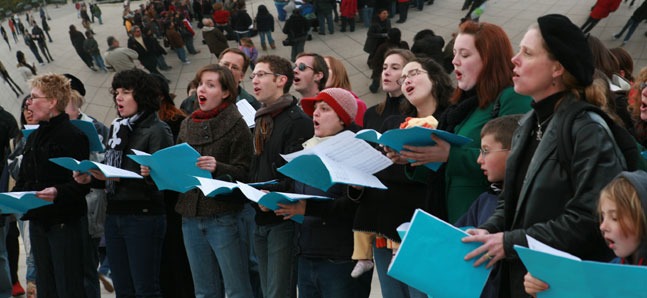A choir of complaints in Tokyo
Duo bring relief with a choir of complaints for MAM Project 10

‘Complaints Choir of Chicago’ 2007 Photo: Clare Britt
Posted: Mon Dec 14 2009
‘I did that job, don’t make it yours!,’ is the first volley in a cascade of complaints that form the backbone of Tellervo Kalleinen and Oliver Kochta-Kalleinen’s ‘Complaints Choir’, now showing at the Mori Art Museum.
Developed and filmed in a selection of cities around the globe over several years, MAM Project 10 features the first Tokyo complaint choir, with the artists’ participation. The complaints set to music offer not only comic relief, but also a poignant slice of life in other cities and a revealing glimpse into our commonalities as people.
Having just returned from Tokyo, the pair did a Q&A with Time Out Tokyo to let us in on their vision, insights, and current projects.
TOT: Was this your first time to come to Tokyo; if so, what was your impression? If this was not your first time, when was the first time and how has this time been different? What do you like/dislike about Tokyo?
TK&OKK: It was our first visit to Tokyo. Before we arrived to Japan we received an excel file with 600 complaints submitted for the choir project. After reading them all we got the feeling that we have lived in Tokyo for 20 years. It is a different reading than a tourist guide to Tokyo, but you will get a very direct connection to the city through the people’s concerns.
One of the first impressions remains still strong; near our home was a small road construction site, 2x2 metres. There were two workers digging a hole and six other guys in uniform with cool looking blinking belts, orange sticks and white gloves were standing around. When we passed the construction site the guys with the sticks all showed us the way and bowed many times. It was amazing. I thought afterwards that this situation contains some key ingredients to Japanese culture. There is the politeness, the need for control and a lot of blinking lights.
TOT: The concept of the Valituskuoro (complaint choir) can be seen as a universal social situation. What were some recurring themes that you noticed throughout the different stages and locations of the project so far?
TK&OKK: Surprisingly people complain mostly about themselves (I am fat and lazy and half-old). Very common are complaints about other people, especially neighbours (My neighbour makes weird animal sounds) In all cities— except Tokyo —people complained also about too much advertisements of all forms; too big billboards, too long TV-ads, too many offers for penis enlargements in your mailbox.
It was also striking that in all cities complaints about global issues, about social injustices, poverty, exploitation, human rights violations and so forth were always vastly outnumbered by more personal complaints.
TOT: What were some of the more striking site-specific complaints that you encountered during the project so far?
TK&OKK: We have listened now to so many complaints, that it is hard to remember single ones. Here is a spontaneous list:
I get arrested when I eat noodles in my Uniform. (Singapore)
My neighbour gives Hungarian Folk Dance Classes above my bedroom. (Budapest)
My dreams are boring (Helsinki)
We have a cowboy for President (Chicago)
Please don't grill kusaya in our flat. (Tokyo)
You can't light cigarettes at the Eternal Fire. (St. Petersburg)
TOT: Humour is one crucial aspect to the success of the choirs. How do you view the role of humour in the project?
TK&OKK: When we organized the first Complaints Choir in Birmingham we did not know how the project will turn out: will it be very depressing? Will we need the help of a professional psychologist to assist the choir? But already in the first meeting of the choir it became clear, that this project is very funny. People were laughing all the time and enjoyed the rehearsal very much. People like singing, and people like complaining. I think humour comes from the combination of those not necessarily related activities, but it is important to take both activities— complaining and singing —serious. Then it is funny.
TOT: Do you feel that the transmuting of spoken or thought complaints into a musical form is part of this humour and relief of the choir, or do you think that by putting it into a ‘formal’ medium, such as the composed music with rehearsals, that it validates people’s complaints even more, imbuing them with more truth or relevancy?
TK&OKK: We found that complaints that are very precise and detailed are often funnier when sung then general ones. For example ‘Tramline 3 smells of pee’ is funnier than ‘Trams are smelly.’ Another effect we found is that people find it funny when a large choir sings about very personal complaint like ‘I cannot stop thinking about sex.’
For choir members it’s precisely the fact that a big choir sings about their individual complaints together that can have a strong effect of relief, empathy or empowerment. In Chicago one participant just had lost her job. For her it was very powerful experience, when 60 other people were singing: ‘My boss outsourced my job but he got to keep his!’ She didn't feel so alone with her problem anymore.
TOT: This was the first choir for Tokyo that had your involvement. As the Tokyo choir progressed, from the perspective of non-Tokyoites, what kinds of insight did you gain on life in this city based on people’s complaints?
TK&OKK: People spent a lot of their time at work, even though the workplaces are not necessarily idyllic places. (I don’t want to take care of my boss when we go out drinking. My boss found my gray hair and pointed that out to me. My work place is full of old men.)
People have difficulties to say NO. (I cannot say ‘no’ to work on holidays.)
There are tensions between older and younger generation. (The number of Japanese young backpackers is declining, and they are losing energy.)
Single women over 35 have difficulties to find good men. Pension records were deleted. Oedo line escalators are too long.
TOT: Was there anything particularly different or interesting in the way that the Tokyo choir accomplished their part of the project? What was the atmosphere during rehearsals or performances like, from your perspective?
TK&OKK: The Tokyo Complaints song was the most challenging musically, so the rehearsals were pretty tough. It was amazing to see how hard choir members worked to learn the song. The atmosphere during the rehearsals was joyful; also thanks to our very sympathetic musician and conductor (Shunsuke Okuchi and Tomoko Kanda) I believe people genuinely enjoyed the project, although due to the language barrier we could not always be sure what was going on in the group.
TOT: What was the public’s opinion of the choirs in the different cities? What about your thoughts on the Singapore choir and their difficulties performing in public? Did that give their part of the project any special meaning for you?
TK&OKK: It is difficult to answer, because the work has many different audiences: the people that see the choir performing live, the people that see the exhibition at Mori Art Museum and then the people that see the clip somewhere on the Internet.
Because each song contains many complaints, audience members living in that particular city always can find something to identify with. Audience members from other cities often find that in their home town people complain more and stronger and more professional. They say: We need a complaints choir too! People seem almost proud of the strong complaints culture in their own city; that’s one reason why the project has spread now worldwide.
In Finland the song became very popular and the choir had to perform it many times on different occasions, for example as special guest on a ministerial conference on work health. Helsinki choir was also the candidate for an annual prize in Finland called ‘Joy of the Year.’ On the Internet Helsinki Complaints Choir is the favourite.
The choir that stirred most controversy was definitely the Singapore Complaints Choir. The matter was finally discussed in Singaporean parliament. It became part of an anthology ‘100 Forbidden Art Works in Singapore.’ It is now one model case for people pushing for reform on public art and freedom of artistic expression in Singapore.
TOT: You are also working on the ‘I Love My Job’ project in Finland. Do you think you will open this project to other cities? The Tokyo choir had a lot of complaints about work. How do you think a project like ‘I Love My Job’ would go down in Tokyo?
TK&OKK: According to the amount and seriousness of work related complaints we received in Tokyo, ‘I Love My Job’ project— that deals with unresolved conflicts at work places and the (revenge) fantasies that can grow from those conflicts —would not have any difficulties to find participants. It would be very interesting to realize it in Tokyo, but honestly, we are also a bit scared to bring it to Japan. We expect extremely violent fantasies.
TOT: Work and complaints are both universals in society... what about dreams? Though your ‘Dreamland’ project deals with dreams with the Finnish President, are there any universal themes in this work?
TK&OKK: The work doesn't deal explicitly with the person of Finnish President. Rather, our intention was to show some aspects of people's subconscious relationship to highest authority, to the state leader. Do we need leaders? And what do we expect from them? We believed that dreams would give interesting access to this relationship, but during the project we learned more and more that we know hardly anything about dreams.
It was funny when I asked some members of Tokyo Complaints Choir if they had seen any dreams about the Japanese prime minister or the Emperor, they just started to laugh and said that this is an impossible thought. They all swear that they never ever would be able to dream about either of them.
MAM Project 10 is showing until Sun Feb 28, 2010 at Mori Art Museum, Tokyo.
Tags:
Tweets
- About Us |
- Work for Time Out |
- Send us info |
- Advertising |
- Mobile edition |
- Terms & Conditions |
- Privacy policy |
- Contact Us
Copyright © 2014 Time Out Tokyo












Add your comment